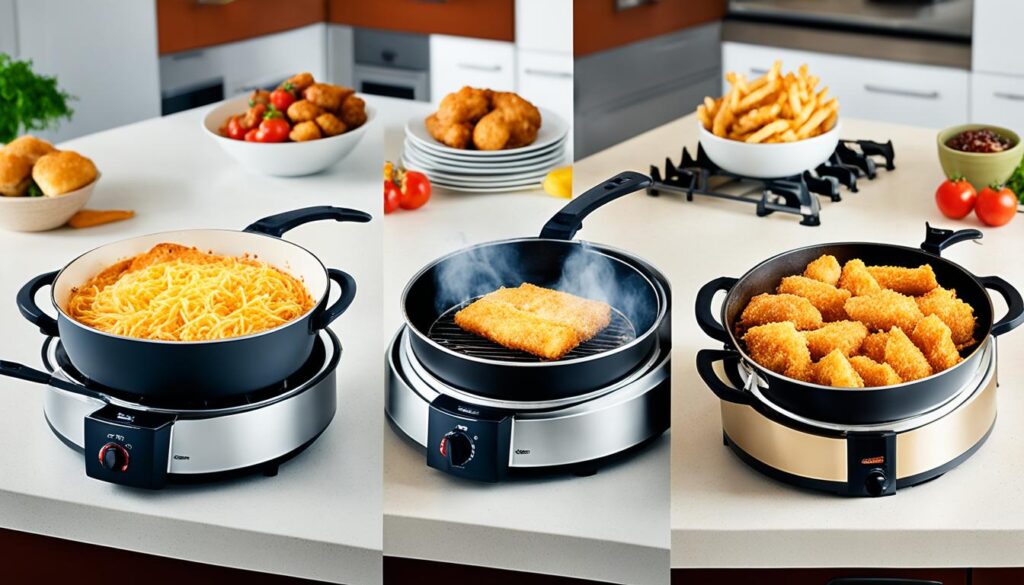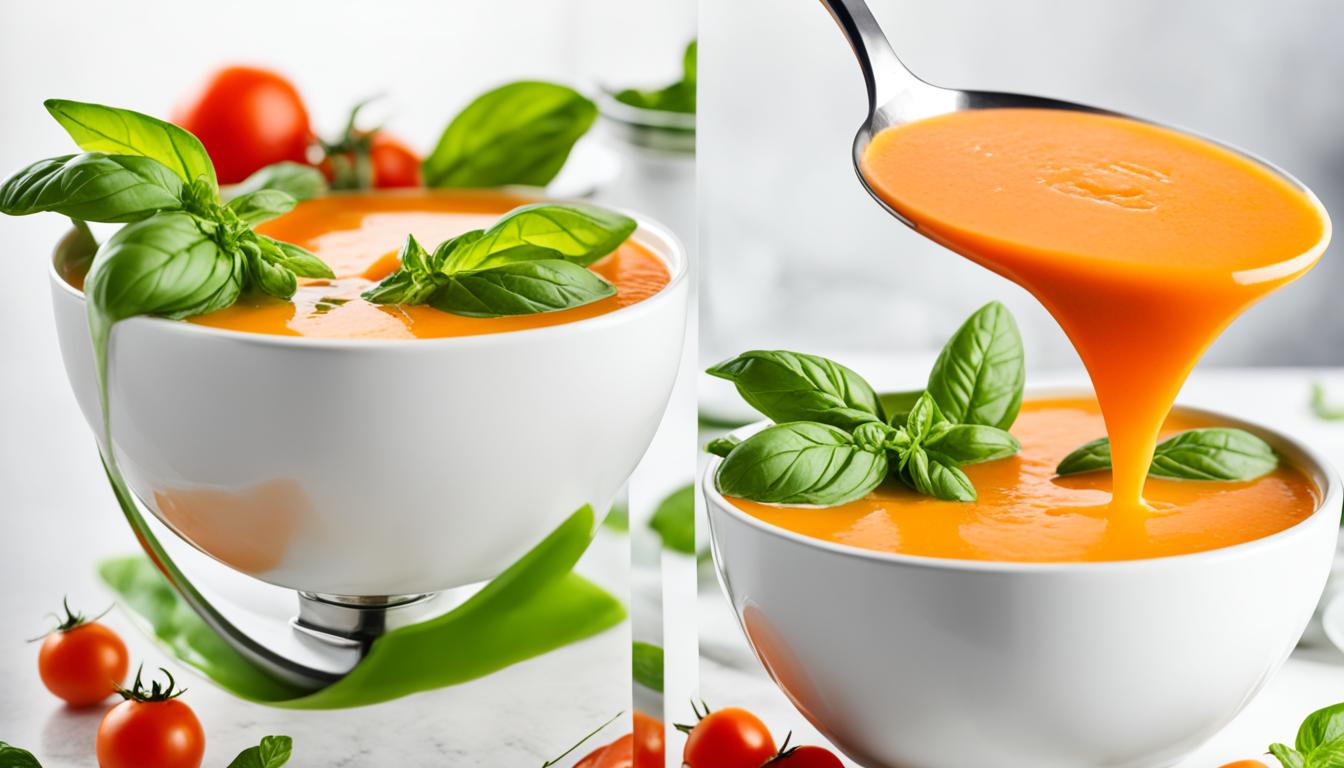Did you know that a deep fryer versus dutch oven comparison is not limited to just frying? These two popular cooking equipment options also have their own unique qualities when it comes to making rich blender tomato soup without cooking. In this article, we will delve into the pros and cons, differences, and which is better between a deep fryer and a Dutch oven for creating this delicious and effortless recipe.
Whether you’re cooking at home or in a professional kitchen, choosing the right kitchen appliance is crucial for achieving the desired results. Let’s explore the world of deep fryers and Dutch ovens and find out which one is best for frying as well as which one suits your needs perfectly.
In the following sections, we will discuss the pros and cons of using a deep fryer and a Dutch oven, their performance comparison, and finally, help you make an informed decision on choosing the right cooking equipment for frying. Let’s get started!
Deep Fryer vs. Dutch Oven: Pros and Cons
When it comes to frying, both deep fryers and Dutch ovens have their own advantages and disadvantages. Let’s take a closer look at the pros and cons of each cooking equipment to help you make an informed decision.
Deep Fryer
- Efficiency: Deep fryers are designed specifically for frying, which means they are highly efficient in heating oil quickly and maintaining a consistent temperature. This results in crispy and evenly cooked food.
- Convenience: With built-in temperature controls and automatic timers, deep fryers are easy to use and require minimal monitoring. They are also equipped with features like oil filtration and drainage systems, making cleanup a breeze.
- Safety: Many deep fryers come with safety features such as locking lids, insulated handles, and automatic shut-off functions, reducing the risk of accidents and oil splatters.
Dutch Oven
- Versatility: Dutch ovens are not limited to frying but can also be used for braising, roasting, and even baking. They are great for one-pot dishes and can be used on stovetops and in ovens.
- Heat retention: Due to their heavy construction and thick walls, Dutch ovens excel in heat retention. They distribute heat evenly, resulting in excellent browning and flavorful dishes.
- Multi-purpose: A Dutch oven can be a valuable addition to your kitchen, serving as a frying pan, stockpot, and even a serving dish. It’s a versatile piece of cookware that offers long-lasting durability.
Ultimately, the choice between a deep fryer and a Dutch oven depends on your cooking preferences, the type of food you plan to fry, and the level of convenience you desire. If you frequently fry food and prioritize efficiency and ease of use, a deep fryer may be the ideal option for you. On the other hand, if you prefer a versatile cooking tool that can handle various cooking methods and dishes, a Dutch oven can be a valuable investment.
Remember, both options have their benefits and drawbacks, so it’s essential to weigh your priorities and consider what will best suit your needs in the long run.
Performance Comparison: Deep Fryer vs. Dutch Oven
When it comes to frying, the performance of a deep fryer and a Dutch oven can vary significantly. Both cooking equipment options have their own unique features and capabilities that can affect the outcome of your fried dishes.
Deep fryers are specifically designed for frying food. Their precise temperature controls ensure consistent heating, resulting in evenly cooked and crispy results. With deep fryers, you can achieve a professional level of frying without much effort. They are also equipped with features like oil filtration systems, which help maintain oil quality and extend its lifespan. Deep fryers are ideal for cooking large quantities of fried food quickly and efficiently, making them a popular choice for commercial kitchens and avid home cooks.
Dutch ovens, on the other hand, are versatile cooking vessels that can be used for various purposes, including frying. While they may not offer the same level of precision as deep fryers, Dutch ovens excel in heat retention and distribution. Their thick walls and heavy lids trap heat effectively, allowing for excellent searing and browning. Dutch ovens are ideal for slow cooking methods, making them suitable for dishes like fried chicken that require a combination of frying and braising.
When comparing the performance of a deep fryer versus a Dutch oven for frying, it’s important to consider the following factors:
- Heat distribution: Deep fryers offer consistent and even heat distribution throughout the oil, resulting in uniformly fried food. Dutch ovens may have slightly uneven heat distribution, depending on the shape and material of the pot.
- Oil capacity: Deep fryers typically have larger oil capacities, allowing for frying larger quantities of food at once. Dutch ovens may have a smaller capacity, requiring multiple batches for larger quantities.
- Temperature control: Deep fryers allow for precise temperature control, ensuring that the oil stays at the desired frying temperature. Dutch ovens may require manual temperature adjustments and monitoring to maintain consistent frying conditions.
- Cooking time: Deep fryers offer faster cooking times due to their efficient heating capabilities. Dutch ovens, on the other hand, are better suited for slow cooking methods and may require longer frying times.
Considering the performance differences between deep fryers and Dutch ovens, it’s essential to evaluate your specific frying needs and preferences. If you frequently fry large quantities of food and value precise temperature control, a deep fryer may be the better option. However, if you prefer versatile cooking equipment that can handle both frying and slow cooking methods, a Dutch oven might be the more suitable choice.

Which is Better for Frying: Deep Fryer or Dutch Oven?
When it comes to frying, deciding between a deep fryer and a Dutch oven can be a tough choice. Both cooking equipment options have their own strengths and weaknesses, making the decision dependent on your specific needs and preferences.
A deep fryer is designed specifically for frying and comes with features tailored to make the frying process easier and more efficient. It has a built-in thermostat, which allows you to accurately control the temperature, ensuring that your food cooks evenly and achieves the desired crispiness. The deep fryer also has a larger frying capacity, making it ideal for cooking larger quantities of food, whether you’re hosting a party or preparing meals for a large family gathering.
On the other hand, a Dutch oven, which is a versatile piece of cookware, can also be used for frying. It offers the advantage of multi-purpose functionality, allowing you to use it not only for frying but also for braising, stewing, and even baking. If you’re someone who prefers having kitchen equipment that serves multiple purposes, a Dutch oven might be the better option for you. It also provides better heat retention, ensuring that your food stays hot even after it’s done cooking.
One of the main factors to consider when deciding between a deep fryer and a Dutch oven is convenience. Deep fryers are generally easier to clean as they come with removable parts that are dishwasher safe. Dutch ovens, on the other hand, require some time and effort to clean, especially if they have food stuck to the bottom. Additionally, the deep fryer allows for more precise temperature control, eliminating the need for constant monitoring, while a Dutch oven requires more frequent temperature adjustments.
Ultimately, the choice between a deep fryer and a Dutch oven for frying comes down to personal preference and individual cooking needs. If you frequently fry food and prioritize ease of use and precision, a deep fryer may be the best option. Conversely, if you prefer versatile cookware that can be used for various cooking methods, a Dutch oven is worth considering.
No matter which option you choose, both a deep fryer and a Dutch oven can be valuable additions to your kitchen. It’s important to assess your cooking preferences and requirements before making a decision. With the right cooking equipment at your disposal, you can enjoy deliciously fried foods whenever you desire.
Conclusion: Choosing the Right Cooking Equipment for Frying
When it comes to frying, there’s a decision to be made: deep fryer or Dutch oven? Both options have their strengths and weaknesses, making it important to consider your specific needs and preferences before making a choice.
A deep fryer offers convenience and precision. With precise temperature control and built-in timers, it takes the guesswork out of frying. Whether you’re making crispy chicken wings or golden fries, a deep fryer ensures consistent results every time. It’s especially ideal for those who frequently fry and want a dedicated appliance for the task.
On the other hand, a Dutch oven provides versatility and charm. With its thick walls and even heat distribution, it excels not only in frying but also in baking, braising, and more. It’s a multi-purpose kitchen essential that can be used for a wide range of dishes. If you’re looking for a versatile piece of cookware that can handle frying and much more, a Dutch oven might be the perfect fit for you.
As you weigh your options, think about the type of dishes you want to prepare and the features that matter most to you. Are you primarily focused on frying, or do you want a versatile piece of cookware that can help you with other cooking methods as well? Consider your needs, preferences, and the space available in your kitchen to make an informed decision.
